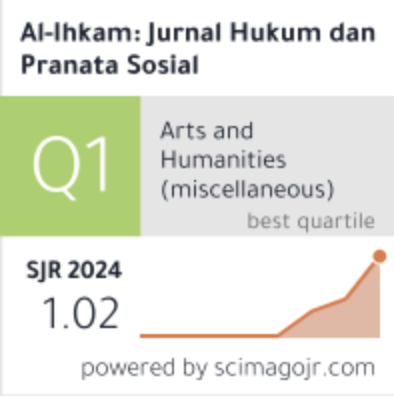MANAKAR KAFÂ`AH DALAM PRAKTIK PERKAWINAN KYAI DI MADURA
 Abstract views: 461
,
Abstract views: 461
,
 PDF downloads: 323
PDF downloads: 323
Abstract
Abstrak:
Kajian ini difokuskan pada persoalan, secara garis besar, bagaimana pandangan kyai tentang kafâ`ah dan praktiknya dalam perkawinan. Kajian ini menggunakan pendekatan kualitatif karena subjek yang diteliti memerlukan pengamatan secara utuh dan menyeluruh tentang kondisi yang sebenarnya. Data dalam kajian ini diperoleh melalui observasi partisipan, dan wawancara mendalam. Kajian ini menghasilkan temuan bahwa kyai melakukan perkawinan antar keluarga dekat dan kerabat yang berasal dari keluarga kyai juga. Mereka menghindari terjadinya perkawinan dengan kerabat lain yang berasal dari keluarga non kyai. Dalam kaitannya dengan sikap perkawinan kyai ini, ditemukan dua tipe kyai yang berbeda yaitu: Pertama, tipe kyai fanatik keturunan; kedua, tipe kyai fleksibel dalam memberikan keputusan. Kyai fanatik keturunan menjadikan faktor keturunan sebagai alasan pertama dan utama dalam memilih pendamping hidup bagi anak-anaknya. dalam mengambil langkah tindakannya kyai fanatik keturunan ini setidaknya dipengaruhi oleh dua hal. Pertama, adanya wasiat nenek moyang yang diikuti oleh generasi berikutnya. Kedua, adanya usaha untuk menjaga kemurnian keturunan. Sedangkan kyai fleksibel tidak begitu fanatik terhadap keturunan dalam mengambil keputusan. Dalam masalah kafâ’ah, selain faktor keturunan, mereka juga mempertimbangkan faktor yang lain, seperti faktor kekayaan, nilai agama yang kuat serta kecakapan ilmu pengetahuan.
Abstract:
This study was designed to examine the view of kyai toward kafâ`ah and its practice in marriage. Qualitative approach has been used to collect intact and whole data from the subject by using the instruments of participatory observation and in-depth interview. It was found that kyai performs a marriage with the close family members and among relatives. They avoid a marriage with a family of different lineage particularly non-kyai family. From the perspective of this marriage attitude, it could be catagorized two types of kyai. Firstly, is a kyai which is offspring fanatic, and secondly, a kyai which is flexible in giving decision. The former is influenced by two factors---firstly, ancestor will and second, the attempts to keep the family chasity. The later is not adhering strictly to the family genuinity. Kafâ`ah also takes a consideration on other factors such as opulence, the firm religious values, and knowledge proficiency.
Kata-kata Kunci:
Kyai, kafâ`ah, Madura, dan perkawinan
Downloads
In order to be accepted and published by Al-Ihkam: Jurnal Hukum dan Pranata Sosial, author(s) submitting the article manuscript should complete all the review stages. By submitting the manuscript, the author(s) agreed to the following terms:
- The copyright of received articles shall be assigned to Al-Ihkam: Jurnal Hukum dan Pranata Sosial as the publisher of the journal. The intended copyright includes the right to publish articles in various forms (including reprints). Al-Ihkam: Jurnal Hukum dan Pranata Sosial maintain the publishing rights to the published articles.
- Authors are permitted to disseminate published articles by sharing the link/DOI of the article at Al-Ihkam: Jurnal Hukum dan Pranata Sosial. Authors are allowed to use their articles for any legal purposes deemed necessary without written permission from Al-Ihkam: Jurnal Hukum dan Pranata Sosial with an acknowledgment of initial publication to this journal.
- Users/public use of this website will be licensed to CC-BY-SA.



.png)
_1.png)


_page-00011.jpg)


